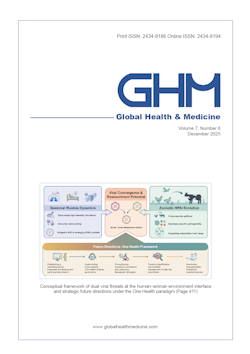Global Health & Medicine 2024;6(3):212-217.
Human papilloma virus (HPV)-related information acquisition and seeking behavior among infected women: A single center crosssectional survey in Shanghai, China
Yuan XH, Lu LL, Jiang RH, Yu Y, Zhou J, Wang L, Du Y
Lacking of adequate knowledge is an obstacle to effective prevention of cervical cancer, yet factors that affect the information acquisition and seeking behavior as well as the information communication process are not well studied. We assessed information acquisition and seeking behavior, as well as perceived barriers of doctor-patient communication regarding human papilloma virus (HPV)-related information of infected women. Among 437 participants, 405 (93%) expressed demands for HPV-related information, while only a small proportion (100/437, 22.9%) actively sought information and felt obstacles comprehending. Web-based channels were most frequently utilized and medical personnel were the most trusted information source. Patients' satisfaction was significantly correlated with doctor's patience (r = 0.581, p < 0.001) and emotional caring (r = 0.555, p < 0.001). Compared to patients not actively seeking information, those actively seeking information were more likely to be single (p = 0.005), had higher education (p = 0.009) and monthly individual-level income (p = 0.023), and was more likely to undergo regular cervical cancer screening (p = 0.003), and were already or willing to be vaccinated (p = 0.008). The actively seeking information group also achieved higher scores in HPV knowledge test (p = 0.007). Public health interventions targeting HPV-infected women using specifically designed educational materials may influence information seeking behavior, increase HPV literacy and knowledge, which could potentially increase HPV vaccine uptake and cervical cancer screening rate.
DOI: 10.35772/ghm.2023.01100







